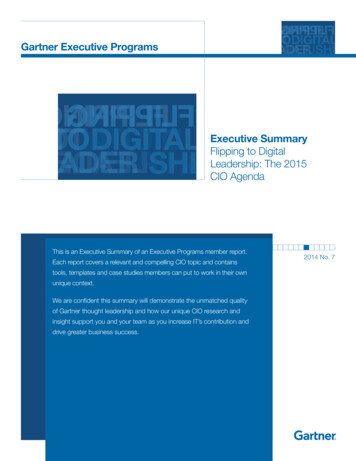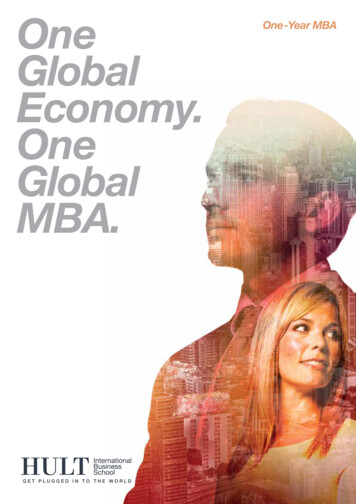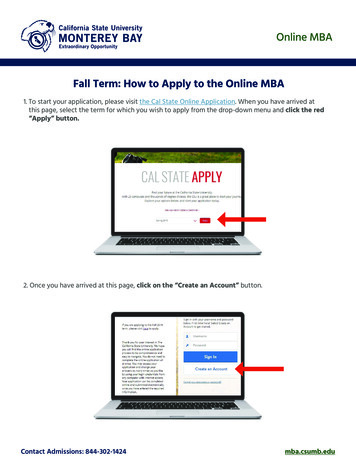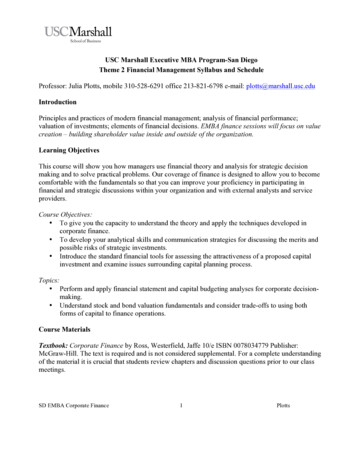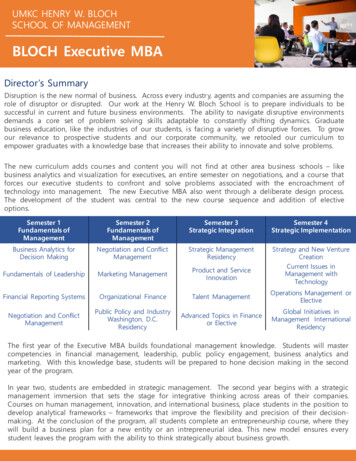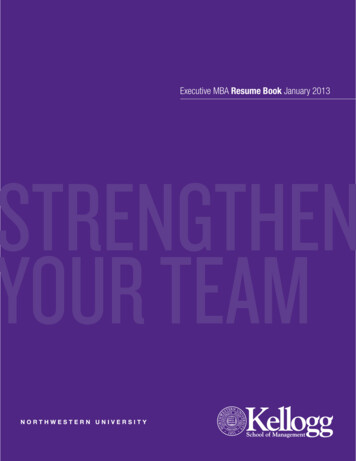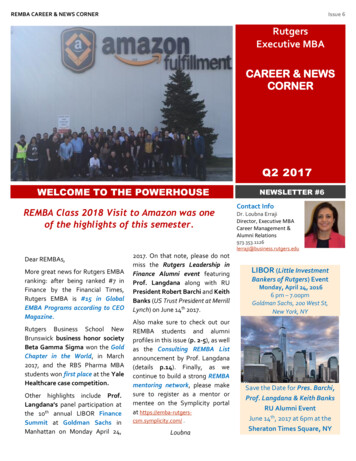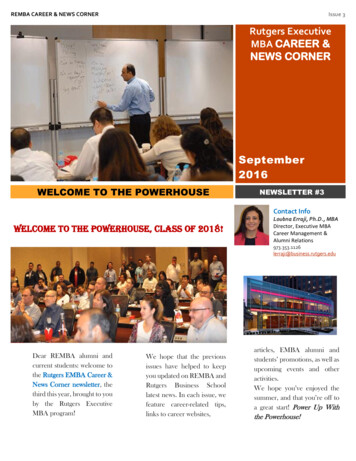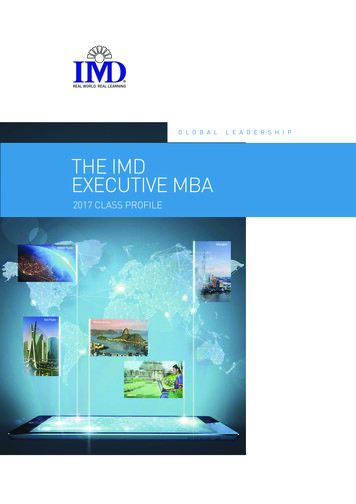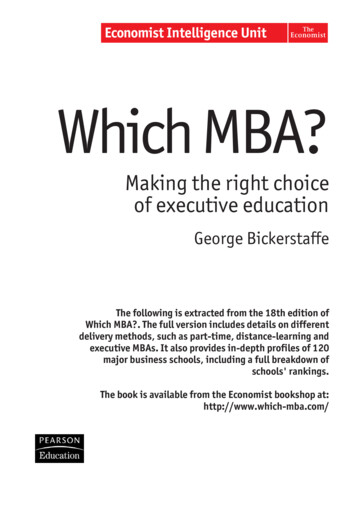
Transcription
Which MBA?Making the right choiceof executive educationGeorge BickerstaffeThe following is extracted from the 18th edition ofWhich MBA?. The full version includes details on differentdelivery methods, such as part-time, distance-learning andexecutive MBAs. It also provides in-depth profiles of 120major business schools, including a full breakdown ofschools' rankings.The book is available from the Economist bookshop at:http://www.which-mba.com/
Pearson Education LimitedEdinburgh Gate, Harlow, Essex CM20 2JEWebsite: http://www.pearsoned.co.ukThe Economist Intelligence UnitThe Economist Intelligence Unit is a specialist publisher serving companies establishing and managingoperations across national borders. For over 50 years it has been a source of information on businessdevelopments, economic and political trends, government regulations and corporate practice worldwide.The EIU delivers its information in four ways: through our digital portfolio, where our latest analysis is updateddaily; through printed subscription products ranging from newsletters to annual reference works; throughresearch reports; and by organising conferences and roundtables. The firm is a member of The Economist Group.LondonThe Economist Intelligence Unit26 Red Lion SquareLondonSW1R 4HQUnited KingdomNew YorkThe Economist Intelligence UnitThe Economist Building111 West 57th StreetNew YorkNY 10019, USHong KongThe Economist Intelligence Unit60/F, Central Plaza18 Harbour RoadWanchaiHong KongTel: (44.20) 7576 8000Fax: (44.20) 7576 8476E-mail: london@eiu.comTel: (1.212) 554 0600Fax: (1.212) 586 1181/2E-mail: newyork@eiu.comTel: (852) 2585 3888Fax: (852) 2802 7638E-mail: hongkong@eiu.comWebsite: http://www.eiu.comElectronic deliveryThis publication can be viewed by subscribing online at http://store.eiu.comCopyright 2006 The Economist Intelligence Unit Limited. All rights reserved. Neither this publication nor any part of itmay be reproduced, stored in a retrieval system, or transmitted in any form or by any means, electronic,mechanical, photocopying, recording or otherwise, without the prior permission of the Economist IntelligenceUnit Limited.ISBN-13: 978-0-273-7071-4ISBN-10: 0-273-71071-0British Library Cataloguing in Publication Data.A catalogue of this publication is available from the British Library.The authors of EIU Research Reports are drawn from a wide range of professional and academic disciplines. All theinformation in the reports is verified to the best of the authors’ and the publisher’s ability, but neither can acceptresponsibility for loss arising from decisions based on these reports. Where opinion is expressed, it is that of theauthors, which does not necessarily coincide with the editorial views of the Economist Intelligence Unit Limitedor of The Economist Newspaper Limited.10 9 8 7 6 5 4 3 2 109 08 07 06 05Printed and bound in Great Britain by Ashford Colour Press Ltd., Gosport.
Have you got what it takes to be a world-class leader?90 exceptional people experience the IMD MBA each year.Launch yourself into the challenge of this intensive, one-year leadership development program:a life-changing experience.Are you: Bright, successful, on the fast track, wanting to make it to the top? A young, experienced international manager with a globalmindset and a burning ambition to lead? Ready to think outside the box and driven by the desire to make a difference?If so, IMD is the place for you.Visit us at: www.imd.ch/mbatel: 41 21 618 02 98 fax: 41 21 618 06 15e-mail: mbainfo@imd.chIMD – International Institute for Management DevelopmentChemin de Bellerive 23, PO Box 915, CH-1001 Lausanne, Switzerland
ContentsWhich skills will tomorrow’s leader need?7Full-time MBAs19Full-time MBA rankings41Open executive programmes49Custom executive programmes57Which MBA? The Economist Intelligence Unit Limited 2006
Extracted from the 18th edition of Which MBA?Which skills will tomorrow’s leader need?Since any form of executive education is about improving your skill set to make you eithermore attractive to recruiters or more likely to win promotion, it is first worth taking a look atwhich skills recruiters say they are looking for.Here we examine the results of a survey of a group of senior executives to find out what theyare looking for in tomorrow’s leaders. They were asked which skills they hoped to find in talented young managers and how these were likely to change over time; which skills were inshort supply; which methods of management education (for example, an MBA or short executive education courses) would most effectively meet those needs; which providers of management education were most important in developing managers; and many other questions.By studying the results of the survey—and comparing them with similar surveys conducted in2004 and 2005—you will get an idea of what companies, and therefore employers orrecruiters, are looking for in their managers and which providers of management educationcan best supply this.Although the survey reveals complex and sophisticated thinking about the use and value ofmanagement education, one thing is clear: there is a greater determination among the executives surveyed to use it to train their best employees. Over the three years the survey hasbeen conducted, the percentage of executives saying they will rely on executive educationmore over the next five years has risen from 35% to 58%. Those expecting no change in theiruse of executive education have declined from 59% to 32% .Over the next five years, do you expect your company will rely less, or more, on executive education(including MBAs) to train its best employees?(%)200420052006More354758No change5941325129LessOnly 8% of the executives surveyed believed that managers can develop all the skills theyneed through experience, and that training has value only as an employee benefit. The number saying that management education is critical in building the knowledge and skills ofmanagers has remained fairly consistent at 31% (30% and 34% in 2005 and 2004 respectively.) Overall, the executives generally believe—as they did in previous years—that experiencecan provide some of the qualities they are seeking but that management education has a rolein topping these up. In other words, the consensus seems to be that an MBA does not makethe manager. Employers are looking primarily for someone with the right personal qualitiesand see education as a way of bridging any skills gap.Which MBA? The Economist Intelligence Unit Limited 20067
Extracted from the 18th edition of Which MBA?Which skills will tomorrow’s leader need?What role does management education and training play in developing your company's best talent?(%)200420052006A manager can develop some of the skills he needs through experience,and the rest can be developed through education and training272931Management education and training is critical inbuilding the knowledge and skills of managers343031A manager can develop most of the skills he needs through experience,and the gaps can be plugged through education and training283730A manager can develop all of the skills he needs through experience,and management education and training is useful only because staffperceive it as a benefit1038As for who is responsible for equipping a manager with those skills, it is clear that most executives (68%) think that the firm and the individual share equal responsibility (though this isa slightly lower percentage than in 2004 and 2005). Only 7% thought the company held theprimary responsibility and 25% said it was mainly something the manager himself or herselfhad to take responsibility for.Who is more responsible for equipping a manager with necessary skills?(%)200420052006Equal responsibility717368The manager himself or herself222125767The companySo what are the skills these executives believe that young managers must have? Top of thelist, perhaps not surprisingly, is honesty and integrity, which is given a rating of 87%, largelyin line with the results of the previous two years.Next come communication skills (84%) and people skills (82%), again showing little changeon 2004 and 2005. The corporate world seems to be delivering a consistent message: theywant their managers to excel in the soft skills, particularly leadership, rather than the harder-edged technical and financial areas (perhaps because they assume managers will alreadybe skilled in these). A good understanding of technology and financial knowledge, for example, is rated rather low at 64% and 57% respectively (virtually unchanged on previous years).Furthermore, as in earlier surveys, previous managerial experience (54%) and managementeducation (51%) are not rated especially highly.Which MBA? The Economist Intelligence Unit Limited 20069
Extracted from the 18th edition of Which MBA?Which skills will tomorrow’s leader need?Which characteristics does your company currently look for in its most talented young managers?(importance rating, %)200420052006Honesty and integrity868287Communication skills808184Excellent people skills818082Innovativeness/openness to new ideas787778Strategic vision757073International knowledge/the ability to manage across cultures636769Deep knowledge of market needs and operations716668A good understanding of technology606164Dealmaking ability636057Financial knowledge585857Management experience575754Management education505451Functional knowledge of various parts of the business596050In five years’ time, do you believe these characteristics will have gained or decreased in importance asthe qualities required of potential company leaders?Increase/decrease in importance (–100 to 100)Innovativeness/openness to new ideas 69International knowledge/the ability to manage across cultures 60Strategic vision 58Communication skills 57Excellent people skills 53Deep knowledge of market needs and operations 51A good understanding of technology 45Honesty and integrity 35Financial knowledge 26Management education 25Dealmaking ability 22Management experience 22Functional knowledge of various parts of the business 17Furthermore, these soft skills are likely to remain high on the agenda of the executives surveyed. Asked to assess those characteristics that will grow in importance over the next fiveyears, the majority opted for these rather than areas such as functional or financial knowledge. Communications skills (57%) and people skills (53%) were both rated as likely toincrease in importance over this period. This is something that has not been lost on providersof management education, particularly business schools. Leadership, communications andethics have become integral parts of the required curriculum of many MBA and executive education programmes. However, the executives surveyed put an even greater emphasis on theneed for different kinds of “soft” skills, perhaps more closely connected to business issues.For example, in an increasingly international and competitive business world, 69% say thatinnovativeness and openness to new ideas will matter more in five years than they do now.Which MBA? The Economist Intelligence Unit Limited 200611
Extracted from the 18th edition of Which MBA?Which skills will tomorrow’s leader need?Coupled with this will be a need for strategic vision and, in particular, an ability to manageeffectively in the global marketplace. Of the executives surveyed, 60% thought that international knowledge and the ability to manage across cultures would grow in importance and58% believe that strategic vision will become increasingly important (these figures haveremained broadly consistent over the three years the survey has been conducted).Both trends reflect underlying realities. Globalisation, evident in such phenomena asincreased offshoring, shows no sign of slowing; indeed, it may well accelerate. Moreover,rather than operating separate businesses in lots of countries, global firms are seeking tointegrate their many operations around the world seamlessly—hence the need for international knowledge and the ability to cross cultures.The emphasis on strategic vision, though somewhat lower, is symptomatic of a move away fromconcentration on core businesses which has defined many firms’ priorities in the past decade.Knowing what skills are likely to be required in the future by potential employers is helpful indeciding which management education options to choose. Even more helpful is to get aninsight into what skills employers believe are in short supply: those that are considered rareare obviously worth acquiring.When asked to identify the main skills shortages among their company’s up-and-coming talent, executives rated strategic vision (32%) and people skills (50%) as most rare. These arequalities that can be hard to teach, of course, though the executives also threw in financialknowledge (51%), market knowledge, innovativeness and management experience (all 53%)for good measure.Which of the following skills are most prevalent and which most lacking among your company's up-andcoming talent?(0 extremely rare, 100 extremely prevalent)200420052006Honesty and integrity646469A good understanding of technology565961Communication skills545560Functional knowledge of various parts of the business545556International knowledge/the ability to manage across cultures424254Dealmaking ability494654Management experience505353Innovativeness/openness to new ideas525153Deep knowledge of market needs and operations505253Financial knowledge485251Excellent people skills545150Strategic vision364332When asked where the greatest talent shortfall will be, strategy is by far the biggest concern,as it was in both 2004 and 2005. Strategy has long been one of the core subjects taught bybusiness schools, particularly on MBA programmes, and it is curious that the executives surveyed expect a shortage of managers with strategic vision. On the face of it, sending up-andcoming managers on an MBA or executive MBA programme might help address the shortfall.However, the second-biggest concern—a lack of managers exhibiting innovativeness andopenness to new ideas (cited by 36% of executives)—seems more difficult to address.Which MBA? The Economist Intelligence Unit Limited 200613
Extracted from the 18th edition of Which MBA?Which skills will tomorrow’s leader need?In which areas do you see the greatest shortfalls in managerial talent over the next five years?(%)200420052006Strategic vision575953Innovativeness/openness to new ideas251636Excellent people skills412532International knowledge/the ability to manage across cultures282230Communication skills241527Deep knowledge of market needs and operations261423Dealmaking ability161421Honesty and integrity173419A good understanding of technology191014Functional knowledge of various parts of the business163712Management experience16328Financial knowledge1688Which type of provider do you believe has the most important role to play in developing executives atyour company?(%)200420052006Business school354249Independent provider/consultant222522In-house trainer291917Corporate university141512Surprisingly perhaps, given that many executives criticise business schools for failing to teachthe business skills they require and for conducting research that they say lacks relevance to“real” business, the survey shows that the executives who responded have considerable andgrowing faith in business schools. In the 2006 survey 49% believe that they play the mostimportant role in developing their managerial talent, a rise from 35% in 2004 and 42% in2005. This has been matched by a corresponding drop in the faith placed in in-house trainers,traditionally the most common form of management education. The survey shows that faithdeclining from 29% in 2004 to 19% in 2005 and 17% in 2006. Figures for independentproviders and corporate universities have remained largely consistent across the three surveys.About the surveyIn May 2006 the Economist Intelligence Unit conducted an online survey of senior executivesasking them their views on what they thought the manager of the future would look like and therole management education would play in equipping future managers with the skills they need.Some 155 senior executives participated in the survey, including C-level executives (CEO, CFO,etc), senior vice-presidents and directors in a variety of functional areas. There was a wide industryspread, including manufacturing, professional services and healthcare. The annual revenue of thecompanies involved ranged from under US 500,000 to more than US 10bn.Which MBA? The Economist Intelligence Unit Limited 200615
Extracted from the 18th edition of Which MBA?Which skills will tomorrow’s leader need?Which of the following courses does your company employ in developing managers?(%)2006In-house training71MBA29EMBA25Executive programmes (open)27Executive programmes (tailored)27Executive programmes (consortia)7The executives do not seem to putting their faith into practice, however. Only 29% of companies use MBAs to develop their managers. This may be because an MBA, as opposed to theother types of programmes mentioned here, is usually paid for by the individual rather thanthe company. A large number (71%) use in-house trainers as the predominant means ofdeveloping their managers, even though only 17% think they play the most important role.One reason could be that this is an efficient and cost-effective way of training large numbersof people in a fairly short time.In your experience, which of the following courses have delivered good value in developing talent at yourfirm?(0 very little value, 100 excellent value)200420052006In-house training676169EMBA526168MBA596266Executive programmes (tailored)596463Executive programmes (open)505355Executive programmes (consortia)444747Asked which types of management education have delivered good value for their firm indeveloping talent, two of those provided by business schools—MBA and EMBA programmesand tailored executive education—were rated at around the same level as in-house training.Only open-enrolment and consortia executive education programmes scored relatively lowfigures. This reflects a growing trend to rate various forms of executive education more orless equally. In 2004, for example, executives said they regarded in-house training as muchbetter value than any business school offering, when it scored 67%, compared with 59% fortailored courses and MBA programmes and 52% for executive MBAs.It is difficult to determine exactly what this change reflects. It is true that business schoolshave devoted considerable energy and resources to their executive education programmes inthe past few years (largely as a response to falling MBA applications). So there may be a perception among company executives that these courses are better designed and organised,more relevant to their needs and, simply, better value.Which MBA? The Economist Intelligence Unit Limited 200617
Extracted from the 18th edition of Which MBA?Full-time MBAsManagement education comes in lots of different packaging. In the MBA market alone thereare at least three distinct delivery methods: full-time, part-time and distance learning. Ontop of that there are short, non-degree executive education courses, which in turn can bebroken down into open enrolment programmes or those tailored to a specific company. Herewe concentrate on full-time programmes.Advantages and disadvantagesA full-time programme is what many prospective students regard as the “authentic” MBAexperience. It certainly offers advantages compared with other options. Studying an MBAfull-time gives you the opportunity to immerse yourself fully in the programme with few distractions from the learning process and in a stimulating atmosphere. Teaching faculty areusually much more accessible than, say, on a part-time evening programme, where time forout-of-class contact is limited. Moreover, the cliché that you will learn at le
e-mail: mbainfo @ imd.ch IMD International Institute for Management Development Chemin de Bellerive 23, PO Box 915, CH-1001 Lausanne, Switzerland 90 exceptional people experience the IMD MBA each year. Launch yourself into the challenge of this intensive, one-year leadership
